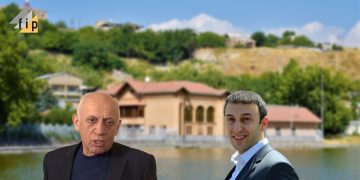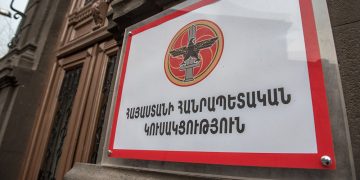Republican Party Deputy Chairman Armen Ashotyan wrote a post on his Facebook page on September 9, questioning the results of the snap parliamentary elections on December 9, 2018.
“Before giving lessons in democracy, he’d better (Nikol Pashinyan-ed.) answer the question where the 50-60 thousand additional votes given by the Republican voters in December 2018 went” Ashotyan wrote.
Two days later, on September 11, in an interview with “Hraparak”, Armen Ashotyan insisted that the RPA votes had been “reduced”. “Immediately after the elections, we said that the votes of the Republicans were reduced; read all our interviews of that time. And we said at that very moment that the RPA had overcome the threshold, and, by the way, the whole republic was sure that the RPA had overcome the threshold” he said, reiterating that according to their estimates, at least 50-55 thousand votes for RPA were stolen.
It should be reminded that as a result of the parliamentary elections in 2018, the RPA received 59,083 votes, not being able to overcome the 5% threshold set for the parties.
What the RPA said in 2018
However, the reality is different. After the parliamentary elections in December 2018, neither in the official statement of the RPA, nor in the statements of the RPA members and in the interviews was there any word about stealing votes from the Republican Party.
Thus, the RPA official statement on December 10, 2018 (immediately after the elections) contains no reference to stolen or reduced votes. Only the following is said about the results: “Certainly, the official data summarizing the elections do not reflect the result we were fighting for.” On the same day, Ashotyan turned to their voters live on Facebook and announced: “Thanks to your trust, thanks to 60 thousand votes, we strengthened our position in the political arena in Armenia.”
In fact, Ashotyan accepted the election results, in particular, the number of votes received by the Republican Party.
Two weeks after the election, on December 25, Ashotyan posted on his Facebook page that the election was marked by numerous reports in the press about the use of administrative resource, the intervention of the security forces, and the violation of electoral law. Ashotyan insisted that after the change of power in Armenia, “hundreds of horrific facts that affected the results of this election will quickly become public property.” But again, there was no question of “reducing” the number of votes.
During an interview with Petros Ghazaryan on Public TV on December 26, Ashotyan again did not question the official results of the elections. “We are not the government, we are not even in the parliament․If the people have decided that this approach is right, then its price has been paid twice: a) being deprived of power, b) not getting to the parliament,” he stated.
We also studied the post-election statements of RPA Speaker Eduard Sharmazanov. He did not make any statement about stealing their votes either. On a Facebook live broadcast, he accused the authorities of creating an atmosphere of fear, and announced that 60,000 dignified citizens had voted for the Republican Party. And in an interview with Aysor.am, he stated that 60 thousand citizens rejected Pashinyan.
About interruptions of vote tabulation process and coercion
In an interview with “Hraparak”, Ashotyan insisted that during the elections there were interruptions in the vote counting process and coercion to provide only the numbers published by the Central Electoral Commission (CEC).
“The clumsy tabulation technologies that were used… You remember the interruptions in the counting process, on one of the televisions, the compulsion to switch exclusively to the CEC numbers, etc. So, at that very moment we said that in fact we had overcome the 5% threshold, we should have been in the National Assembly,” Ashotyan said.
However, it is not clear what the RPA deputy chairman means by “clumsy tabulation technologies”, as the counting of votes took place with the same technologies as during the 2017 parliamentary elections. It should be reminded here that before the 2018 elections, the package of amendments to the Electoral Code was introduced, but the RPA deputies voted against it and the elections were held according to the old code.
As for the interruptions in the vote counting process, Armen Ashotyan’s statement is perplexing.
According to the report of the “Independent Observer” public alliance, which observed the elections in 300 polling stations, cases of delayed start or interruption of the voting process were registered only in 14 polling stations (only in 4% of the total number of polling stations observed). For comparison, during the 2017 parliamentary elections, according to the same observation group, there were cases of delayed start and interruption in 24 percent of the observed polling stations (200 in total).
Moreover, in each polling station, the Republican Party had either a chairman of the commission or a secretary of the commission, and the party representatives did not submit any request to conduct a recount of the voting results in any precinct.
Ashotyan’s assertion about the alleged coercion used against the televisions is difficult to understand too. The election results were reported faster by some TV companies than by the CEC (for example, Shant TV), and there were no restrictions. We could not find any information regarding Ashotyan’s assertion about reporting figures provided by the CEC.
The Fact Investigation Platform contacted Armen Ashotyan, trying to get a comment on his allegations, but the RPA deputy chairman replied that he will not give an interview to us.
Thus, the assertion of the RPA deputy chairman Armen Ashotyan that their party got 50-60 thousand more votes than the official results show is something new, since neither his previous statements nor those of the RPA mentioned it. His claims that the televisions were forced to report only the results published by the CEC do not correspond to reality.
Hovhannes Nazaretyan

 FACTOMETER
FACTOMETER










